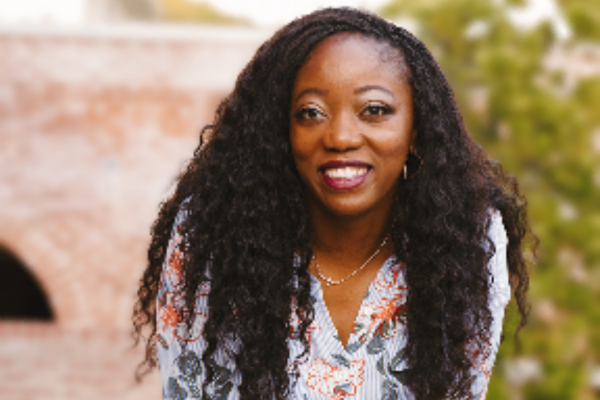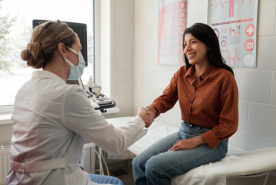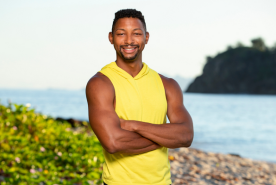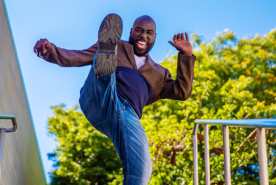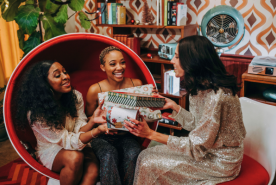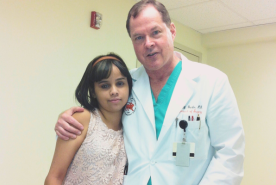September 14, 2023
When Tania Kasongo learned her father needed a kidney, she immediately stepped up to become a kidney donor so his health wouldn't continue to spiral. Despite not being his match, she continued forward and changed not only her father's life but the lives of seven other people.
Tania's decision to donate
[VIDEO::http://www.youtube.com/watch?v=vZvVdgNWpE4::aVideoStyle]
In 2014, Tania's father learned that his kidneys were failing. This was a shock, but he quickly got on the transplant waitlist while his daughters started the donor evaluation process.
"It was just a no-brainer. When someone you love is going through a tough time, you do whatever you can to help them out," Tania said. "In this instance, the transplant team decided to go with my kidney over my sister's."
While Tania was sure about her decision, she was still nervous.
"I had to focus on the end result as opposed to the process. I wasn't sure how the surgery would go because I'd never had one," said Tania. "I was also nervous about kidney rejection. Those were my main concerns but I did my best to not let them overwhelm me."
Tania learned she was in excellent shape to donate but didn't match her father. Luckily, she qualified for one of the transplant center’s paired kidney exchange programs, where incompatible donors “swap” recipients, called a Never Ending Altruistic Donor (NEAD) chain. In this program, an altruistic or non-directed donor selflessly donates to a person who has a willing but incompatible donor. That donor then gives it to another person waiting for a transplant. This cycle continues for as long as possible, benefiting multiple individuals in need of transplants.
"Our center is part of the National Donor Registry. They work with different centers to help more people get kidneys so I became part of a paired kidney exchange program. I went through a fair amount of testing but they helped me feel better about living donation because they help ensure the best match possible for the recipients," Tania said. "The first chain was 16 pairs but it didn't work out. I later became part of a seven-pair chain. It's cool to think I was part of helping seven people get a better quality of life."
Learn more about paired kidney exchange programs.
Donating a kidney
Tania donated her kidney on August 13, 2014.
"I woke up early on the day of the surgery and left New York City for Ohio, where I grew up and my mom and dad live. They are originally from the Congo but moved there after I was born," Tania said. "The logistics that go into a transplant are amazing. All the transplant centers put together a schedule so everything goes smoothly. It was like an orchestra."
When Tania woke up, she was happy to learn that the transplant surgery went smoothly.
"In the short term, I had soreness in my lower abdomen region," said Tania. "In the long term, I've had no physical issues. I took one month off so I could stay in Ohio since I needed to check in two weeks and a month off the surgery. I used a couple of weeks of vacation time and then short-term disability. Thankfully, my manager was incredibly supportive."
Tania's manager had experience with kidney disease; her mother was diagnosed with it.
"She provided me with resources and shared the number of a man who had donated his kidney to his wife in the 1980s," Tania said. "Donating a kidney was a unique experience and I felt so supported. Everybody at the company sent me gift baskets and cheesecakes to enjoy during recovery."
Are you interested in donating a kidney? Sign up for "Becoming a Living Donor," a free online course that teaches you everything you need to know.
Using her voice to make a difference
While Tania's coworkers knew about her donation, she didn't often discuss it.
"It took me seven years after the surgery to speak up. In Congolese culture, you don't speak about health issues," Tania said. "I decided to talk about it because my story could save lives. Many people lose their lives because no one talks about organ issues or views these issues as a personal failure. In many cases, however, organ issues or failure are out of your control.
Now Tania is working to inspire others to become living kidney donors.
"I realized I had to speak up more, not only as an African person but as a Black person living in America too. Our community has higher rates of kidney disease. It's important to show that I'm still walking around and strong after donating a kidney. My dad is also thriving," said Tania. "Donating a kidney gets people off dialysis and improves their quality of life. The transplant team looks out for the donor before, during, and after the surgery. You're not left worse off than before you donate. It's a big decision, but worth it."
When Tania isn't sharing the joys of kidney donation, she supports NKF's mission to end kidney disease and help patients as a Voices for Kidney Health advocate.
"NKF is doing such great work adding to the education of kidney disease," Tania said. "Their advocacy in Congress regarding the Living Donor Protection Act is also amazing. Living donors should be supported and not financially worse off or discriminated against by insurance companies."
